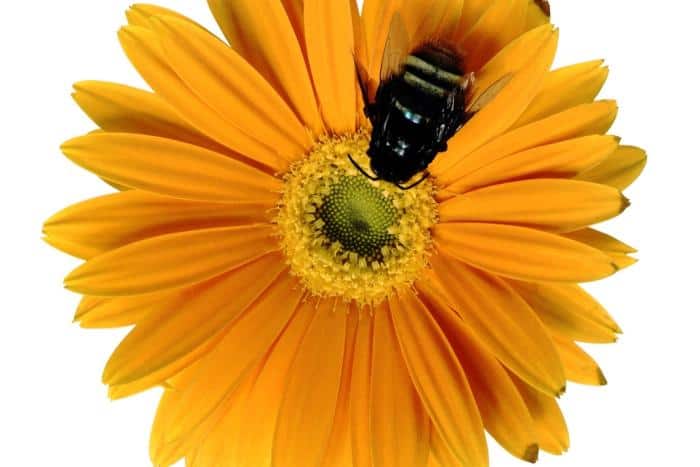Bee pollen is got from honeybees.
As bees flit from flower to flower, gathering honey, the pollen in these flowers gets stuck on the hairy legs of the bees.
When the bees return to their hives, the pollen gets scraped off as they walk around the hives.
This pollen falls into the pollen traps set by beekeepers and when it is full, it is taken away, cleaned and sold as fresh, natural bee pollen for human consumption.
Bee pollen diet is popular since it is rich in vitamins A, D, C, K, B vitamins except B-12, amino acids, proteins, carbohydrates, trace elements and minerals like phosphorous, calcium, selenium, manganese, magnesium, potassium, sodium, boron, titanium, copper, zinc, iron, sulfur, chlorine and more.
Benefits of bee pollen
A bee pollen diet is recommended by many nutritionists since it is meant to improve energy, prevent PMS, help athletes improve their performance, act as a cure for allergic rhinitis, hay fever, rheumatism, prostate problems, and many other ailments.
How can bee pollen be included in your diet?
Bee pollen diet can consist of tablets, granules or capsules, which are the most popular ways to consume it.
The quantity you take and the best form of bee pollen really depends on individual preferences.
Some bee pollen proponents like Dr. Cherbuliez says that soaking bee pollen in water for at least 12 hours before consumption helps to improve absorption rates.
However, there is no supporting research about this although it could help those with impaired digestive problems.
It is recommended that those who starting bee pollen diet for the first time take a tolerance test to check their sensitivity to it.
Take a single granule or kernel of bee pollen and place it under the tongue until it completely dissolves. It gets rapidly absorbed via the mucous membrane into the bloodstream.
If there is no reaction, the number of kernels can be increased until the person is absolutely sure that they are not suffering any adverse reactions.
Allergic symptoms are a usually runny nose, itchy throat, sweating, headaches, tearing eyes and other symptoms.
If you do experience such symptoms, it is best to consult a doctor immediately and discontinue using a bee pollen diet.
In case you have purchased soft gel capsules, just pick one with a knife, mix it in water or juice and drink it to test your tolerance levels.
Bee pollen need not be taken as a vitamin supplement. It can be added to any food, juice or plain water and consumed.
If there is a dosage prescribed on the supplement label, then you can follow that for excess can cause side effects like an extreme jolt of energy.
A bee pollen diet really depends on the type of product you purchase. It can be simply chewed and swallowed. For those who find this unpalatable, you can include bee pollen granules in yoghurt, cereal, juices, smoothies or granola.
How you include it in the diet is not as important as trying to consume at least a small quantity each day as long as you do not suffer from allergies.
Make sure about the strength of the bee pollen you buy so that you can take the right amount every day.
Avoid using it with warm or hot foods for this can kill the nutrients.
Store bee pollen products – capsules, tablets or granules - in the freezer, or in the fridge to prevent contamination from mold.
What to check when buying bee pollen supplements

When purchasing bee pollen supplements, it is good to check their country of origin.
Since it is a natural product, environment and pollution play a major role in the purity of the product. Bee pollen produced in industrialized cities can contain more harmful toxins.
Do not buy bee pollen that has been heating dried or processed.
This will kill all enzymes and essential nutrients. Freeze-dried bee pollen will not be degraded or oxidized.
Precautions with Bee Pollen
Although bee pollen diet is promoted as a cure for pollen and other allergies, it can actually worsen allergic conditions especially in those who suffer from plant pollen allergies, allergies to bee sting and honey.
Read detailed precautions here>
Bee pollen could also be contaminated with pesticides, germicides, fungicides, etc. that the bees can carry back along with the pollen.
An analysis of bee pollen samples has shown that there have been cases of it having chemical contaminants, mycotoxins and fungi.
Bee pollen can cause allergic reactions like problems with breathing, hives, itching and swelling, dizziness, liver problems and even anaphylactic shock.
Always check with your doctor before starting a bee pollen diet.
Anyone who does not suffer reactions can purchase good quality bee pollen products from top brands and eat, swallow, or drink it for a bee pollen diet offers many benefits.

Feels like a stupid question, but... do you have to absorb it under your tongue? Or can you just put it in a cap and swollow?